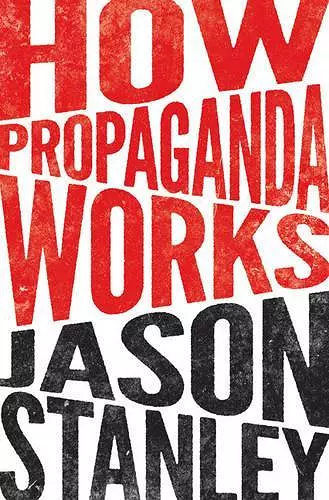How Propaganda Works
Format:Paperback
Publisher:Princeton University Press
Published:6th Dec '16
Currently unavailable, our supplier has not provided us a restock date

Our democracy today is fraught with political campaigns, lobbyists, liberal media, and Fox News commentators, all using language to influence the way we think and reason about public issues. Even so, many of us believe that propaganda and manipulation aren't problems for us--not in the way they were for the totalitarian societies of the mid-twentieth century. In How Propaganda Works, Jason Stanley demonstrates that more attention needs to be paid. He examines how propaganda operates subtly, how it undermines democracy--particularly the ideals of democratic deliberation and equality--and how it has damaged democracies of the past. Focusing on the shortcomings of liberal democratic states, Stanley provides a historically grounded introduction to democratic political theory as a window into the misuse of democratic vocabulary for propaganda's selfish purposes. He lays out historical examples, such as the restructuring of the US public school system at the turn of the twentieth century, to explore how the language of democracy is sometimes used to mask an undemocratic reality. Drawing from a range of sources, including feminist theory, critical race theory, epistemology, formal semantics, educational theory, and social and cognitive psychology, he explains how the manipulative and hypocritical declaration of flawed beliefs and ideologies arises from and perpetuates inequalities in society, such as the racial injustices that commonly occur in the United States. How Propaganda Works shows that an understanding of propaganda and its mechanisms is essential for the preservation and protection of liberal democracies everywhere.
Winner of the 2016 PROSE Award in Philosophy, Association of American Publishers "Provides valuable insights into an important and timely subject."--Michiko Kakutani, New York Times Book Review "[T]he book crackles with brilliant insights and erudition, while also managing to explain the arcane preoccupations of analytic philosophy in a way that's accessible to a wider audience."---Bookforum "How Propaganda Works deserves huge praise and should be read by anyone who cares about politics and language. Its trove of tools and insights is impossible to completely summarise here."--The National "As with other books that expose hidden patterns in American political life from a great height (those that come to mind are Edward S. Herman and Noam Chomsky's Manufacturing Consent and Michelle Alexander's The New Jim Crow), the lofty perspective of How Propaganda Works challenges researchers to fill in gaps with more detailed, particular explanations of how and why."--Stephen Siff, Journalism & Mass Communications Quarterly "Rich and thoughtful... The best way to fight propaganda is to become savvier about how it manipulates, how it actually works, as Stanley does in his work."--Desmog Canada "Brilliant and incisive."--Survival: Global Politics and Strategy "[A] timely and important work that contributes a good deal of theoretical understanding to a crucial yet relatively neglected topic of inquiry."--Spinwatch "A book uniquely suited to its time... An example of political philosophy at its finest."--Voegelinview "Stanley tracks propaganda's history across continents and through decades, illuminating its power to make people vote against their own best interests. And what he has found is [that] the words being used may be as important as the politics behind them."--Nick Osbourne, Boston Globe "Citing examples ranging from historical racism in America to Citizens United, Stanley's critique of propaganda and ideology will only prove more influential as public and political opinion is further polarized... [A] useful examination of propaganda's pervasiveness."--Kirkus Reviews "Stanley has produced a highly stimulating book that brings the issue of propaganda to the attention of political philosophers and draws on an impressive range of philosophical and social scientific sources to illustrate his analysis and provide support for his claims. It is bound to be widely discussed and debated."--Jonathan Wolff, Analysis "A searching, eclectic, lively and personal book."--Matthew Festenstein, Political Theory
- Winner of PROSE Awards: Philosophy 2016
ISBN: 9780691173429
Dimensions: unknown
Weight: 454g
376 pages